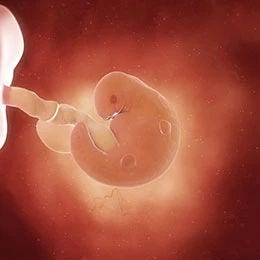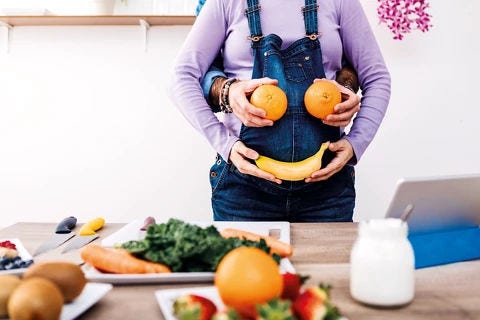At 6 weeks pregnant your baby is now about 8mm long - double the size they were last week but still only the size of a little tadpole. Their tiny heart has already started to beat at about 100–130 beats per minute as blood begins to circulate. The little buds that will become arms and legs are starting to form. Brain waves are detectable from day 40 as brain tissues are growing rapidly. Their eyes are starting to take shape and have already started to darken with pigment.
Your baby’s development

Pregnancy symptoms at 6 weeks pregnant
At 6 weeks pregnant, you might be starting to notice some of those tell-tale early pregnancy symptoms. For example, a missed period, feeling more tired than usual, sore breasts and a change to your sense of taste and smell.
You might also develop a dislike for some of your favourite foods and instead get a taste for something in particular, which could be the beginnings of those much-talked-about pregnancy cravings.
6 weeks pregnant and no symptoms. Should I be worried?
Every pregnancy is different. At 6 weeks pregnant, you may not even know that you’re expecting a baby, not to mention that some women experience very few or no pregnancy symptoms at all.
If you’re yet to notice any pregnancy symptoms at 6 weeks, there’s nothing for you to worry about.
Pregnancy cramps at 6 weeks
Cramping or abdominal pain can be one of the symptoms of early pregnancy and is relatively common. It usually feels similar to period pain¹ and can have a number of causes, including:²
- Ligament pain. This can happen as your uterus grows and stretches to accommodate your growing baby.
- Constipation.
- Trapped wind.
Sometimes, cramping or abdominal pain can be a sign of something more serious, and it’s important to seek advice from your midwife or GP if you’re concerned. The NHS has helpful guidance about when to seek immediate medical advice; you can read it here.
Bleeding and spotting at 6 weeks pregnant
In the early stages of pregnancy, you might experience some light bleeding and spotting or notice some pink or brown discharge3. This is usually harmless and may well be what is known as implantation bleeding, which is a sign of your pregnancy developing.
Implantation bleeding usually happens around the time that your period is due and is the result of the developing embryo attaching itself to the wall of your uterus4.
Bleeding or spotting during your pregnancy can be very unsettling at whatever stage it occurs. Rest assured that this happens to lots of women and it doesn’t always mean that something’s wrong. However, it’s always best to seek medical advice if you have any bleeding at all during your pregnancy to ensure everything is as it should be.
Your baby's development in the womb & size at week 6 of pregnancy
At 6 weeks pregnant, your baby is growing and changing fast - there’s a lot going on!
Measuring approximately 8mm long, your baby is about the size of a tadpole, having doubled in size since last week.
The embryo now has little buds which will develop into arms and legs, which, later in your pregnancy, you’ll be able to feel moving around in your womb. There are also the beginnings of your baby's eyes, which have started to darken with pigment.
Their ears have started to form, and your baby is now covered with a thin layer of see-through skin5.
Your baby’s tiny heart is now beating at around 100-130 beats per minute as their blood starts to circulate, and their brain is also developing rapidly. In fact, by day 40 of your pregnancy, brain waves can be detected6.
Other exciting developments this week include your baby’s liver and musculoskeletal system¹.
What is happening to my body at 6 weeks pregnant?
As your pregnancy progresses, your body goes through many changes as it grows and adapts to the needs of your growing baby.
You may be starting to experience some morning sickness due to the rising pregnancy hormones in your body. Despite its name, morning sickness can actually occur at any time of the day¹. Eating little and often can help with nausea and don’t hesitate to take the rest you need. Try nibbling a dry cracker before you get up in the morning, as it might help to settle your tummy.
Other body changes at 6 weeks pregnant might include1:
- Headaches.
- Feeling bloated.
- A milky white vaginal discharge.
- Brown patches or darkened skin on your face.
- Your hair becoming thicker and shinier - one of the more enjoyable early pregnancy symptoms!
You can read more about the various pregnancy body changes and get the support and confidence you need to embrace how your body is changing at every step.
Vitamins during early pregnancy at 6 weeks pregnant³
During early pregnancy, it’s important to get the vitamins and minerals that you and your growing baby need to stay healthy.
As well as eating a healthy and balanced diet, you’re advised to take 400 micrograms of folic acid every day7. This will support your baby’s nervous system as it forms and help to reduce the risk of neural tube defects such as spina bifida.
Vitamin D is also very important as your baby grows and develops, and all pregnant women are advised to take a daily vitamin D supplement during pregnancy right up until their baby is born.
- https://www.nhs.uk/start4life/pregnancy/week-by-week/1st-trimester/week-6/
- https://www.nhs.uk/pregnancy/related-conditions/common-symhttps://www.nhs.uk/pregnancy/related-conditions/common-symptoms/stomach-pain/ptoms/stomach-pain/
- https://what0-18.nhs.uk/pregnant-women/concerns-during-pregnancy/bleeding-pregnancy
- https://www.nhs.uk/pregnancy/related-conditions/common-symptoms/vaginal-bleeding/#:~:text=Implantation%20bleeding,period%20would%20have%20been%20due
- https://www.nhs.uk/pregnancy/week-by-week/1-to-12/6-weeks/
- https://www.ncbi.nlm.nih.gov/books/NBK234146/
- https://www.nhs.uk/pregnancy/keeping-well/vitamins-supplements-and-nutrition/
- Davies SC et al. VITAMIN D - ADVICE ON SUPPLEMENTS FOR AT RISK GROUPS [Online]. 2012. Available at: https://assets.publishing.service.gov.uk/government/uploads/system/uploads/attachment_data/file/213703/dh_132508.pdf [Accessed: December 2020]
Last reviewed 15.09.2022
Reviewed by Nutricia’s Medical and Scientific Affairs Team
Related articles
Pregnancy topics
Need free advice with a smile? Get in touch with our dedicated Care team.
Ask us a question (8am - 8pm Mon-Fri, 10am - 5pm Weekends)
Messenger
Message us (10am-10pm Mon-Sat, 10am-5:30pm Sun)
Call Us
Call us on 0800 977 8880 (8am-8pm Mon-Fri, 10-5pm Sat)
FAQs
Get answers to your most frequently asked questions














